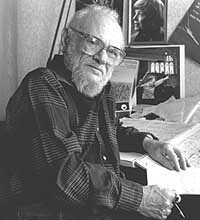American composer Ralph Shapey, 1921–2002
 Ralph Shapey |
Ralph Shapey, an American composer who united avant-garde and romantic sensibilities, died Thursday, June 13. He was 81 years old.
Born in Philadelphia on March 12, 1921, Shapey began musical training in violin at age 7. At 16, he began studying violin with Emanuel Zeitlin, embarked on composition studies with the German composer Stefan Wolpe and was selected as the youth conductor of the Philadelphia National Youth Symphony Orchestra. Shapey graduated from public high school in 1939 but received no other formal education. At 21, he was a guest conductor for the Philadelphia Symphony Orchestra.
Shapey’s musical career was interrupted for three years when he served in the U.S. Army during World War II. In 1945, he moved to New York, where he absorbed the influence of Abstract Expressionist painters and worked first as a freelance violinist, then as a composer, conductor and teacher. In 1963, Shapey commuted to Philadelphia, where he conducted the orchestra and chorus at the University of Pennsylvania.
In the fall of 1964, Shapey joined the composition faculty at Chicago as a Professor of Music. That same year, he founded the Contemporary Chamber Players, a professional new music ensemble dedicated to the performance of 20th-century works. He served as the Chamber Players’ music director and conductor for 27 years and taught many eminent composers, including Pulitzer Prize winner Shulamit Ran, now a Professor in Music and the College.
Shapey wrote more than 200 compositions, including solo pieces, duos, trios, string quartets, chamber works for woodwinds, percussion and piano, and larger works for chorus and orchestra. Recordings of his music are available on the CRI, Opus One and New World record labels.
During his career, he received commissions from the Fromm Foundation, the Library of Congress-Elizabeth Sprague Coolidge Foundation, the Koussevitsky Foundation, the National Endowment for the Arts, the Philadelphia Orchestra, the Chicago Symphony Orchestra and many individual performers.
As a conductor, Shapey led the New York Philharmonic Chamber Music Society, the Buffalo, Chicago, Jerusalem, London and Philadelphia symphony orchestras, and the London Sinfonietta.
Throughout his career, Shapey won numerous awards and honors, among them the George Gershwin Award in 1951, a MacArthur Fellowship in 1982 and the 1990 Friedheim Award given by the Kennedy Center. He was elected to the American Academy and Institute of Arts and Letters in 1989 and the American Academy of Arts and Sciences in 1994.
Shapey attributed the intensity and openness of his work to an early brush with death. Two weeks after he was born, he came down with double pneumonia and was given up for dead by his doctors. But, Shapey had said his father “seemed to have had one inch more brains than the doctors themselves. … He held me up by the ankles and beat the hell out of me. ... I yelled, I cried, I screamed, and as I did all that, I coughed and my lungs cleared. … It has always been a big surprise to me that, yes, I am alive. And I have always felt that I had to battle twice as hard because I had to battle not only for life, but I had to battle death as well.”
Originally, he had decided to become a composer simply in order to understand music. After staying up all night at the age of 16, preparing to conduct Beethoven’s eighth symphony, Shapey recalled that he heard a subconscious voice accusing him during the performance: “What the hell are you doing up here? What do you think you’re doing? Just because you can wave your arms around better than a lot of people, so what? What do you know? … Do you really know what Beethoven intended here? Come on, in order to know what Beethoven truly intended you have to become a composer.”
He followed this subconscious voice to a productive career that he described as guided at its highest points by sheer intuition. Describing the “marriage of the conscious and the unconscious” in composing, he once said, “you reach the highest levels of creativity, and it is as though you are not there, it is as though someone else, something else … is doing it, not you. You don’t even exist at that particular moment. In retrospect all you remember is how wonderful, how positively magnificent it felt.”
In 1991 Shapey retired from the University. He continued to conduct the Contemporary Chamber Players until 1994. Just this year, he published the well-received A Basic Course in Music Composition. According to his widow, Elsa Charlston, Shapey was energetically composing until a few days before his death. He is survived by Charleston, their son Max, and two grandchildren.
![[Chronicle]](/images/small-header.gif)